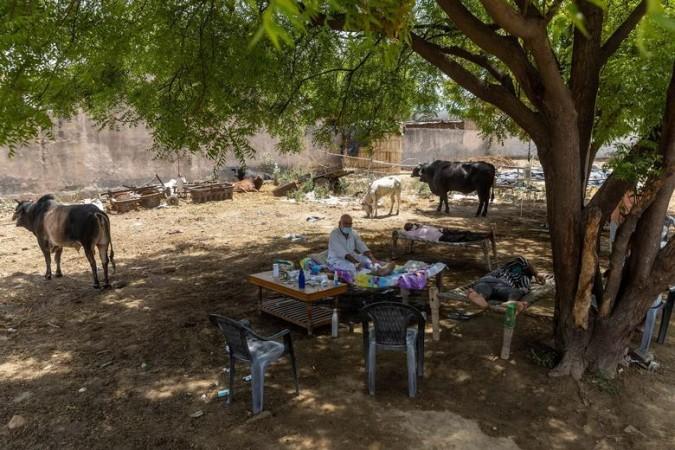On Thursday, Bhairavi Jani, a fourth-generation entrepreneur and Executive Director of SCA group of companies took to her microblogging account to tweet a series of messages that bring to light covid realities in rural India.
Bhairavi, who has been listed as one of the 30 most Powerful Women by India Today in the past, is currently battling covid-related complications at Lilavati hospital in Mumbai. She picked up the virus in a tiny village of Munsyari block, Pithoragarh district in Uttarakhand.
"Our little village in Munsyari Block of Pithoragarh district is a small place (with) 8,000 folks in a cluster of villages. Let me tell you this virus has now reached even the remote glacial base villages... Our healthcare system suffers from poor infra but also from anchored biases about how our poor & rural folk think of healthcare - something expensive, something to be avoided and something that kills," Tweeted Bhairavi on Thursday early morning.

In a series of tweets and threads, she highlighted the gap in communication on Covid-related information and how healthcare in rural mountain villages is considered expensive and unnecessary. And even though there are camps organized to test the villagers, she wondered if villagers are properly guided on covid-appropriate behaviour between giving a sample for the test and receiving the report.
Change this first. You have to create faith, belief in science & healthcare. It won’t be easy but without this neither will u beat covid and nor do u have hope in ironing out India’s healthcare system issues.This fear against healthcare facilities makes people NOT report symptoms
— Bhairavi Jani (@Bhairavi_Jani) June 10, 2021
Although her initial test result came negative, she showed symptoms upon which the local PHC doctor conducted another test that came positive. After getting critical, she had to be airlifted to a hospital in Haldwani from where she later got moved to the Mumbai hospital for better treatment.
In one of her posts, she admitted that it's a "luxury that I could afford but I shudder to think what happens to those who can't afford this luxury."
Failure of Cowin slot booking
Among several issues highlighted in her posts, isolation at home, using COWIN to book vaccination slot, over-medication or unnecessary medication stood out the most. Most village homes have a common toilet and hence, even if somebody who is positive and has to isolate at home, will have to use the same toilet.
Vaccine: Stop obsessing with tech like Cowin & let people in rural areas get vaccinated easily. My husband & I have now sat for three weeks everyday trying to book slots for poor villagers at local PHC bcoz they can’t operate your system. Just junk it. Follow what u do for BCG.
— Bhairavi Jani (@Bhairavi_Jani) June 10, 2021
"Rural PHCs and Asha workers have been giving Ivermectin when there are no symptoms or positivity even," she pointed out.
Rural India, the new covid epicentre
A TOI report dated June 10 suggests that rural Karnataka accounted for more positive cases than urban cities in the last few weeks. "More Covid cases were reported from rural areas than urban in 22 districts of the state between May 25 and June 8, accounting for over 50% to 85% of total cases."
"We have mandated at taskforce meetings that no Covid patient in rural areas should be allowed to isolate at home. They must either be taken to Covid care centres or hospitals based on the requirement. It's a must to curb the spread," the report quoted deputy CM and head of the Covid task force CN Ashwath Narayana as saying.
On Tuesday, A BBC India report by their correspondents Vikas Pandey and Anshul Verma cited the issue of 'unknown' Covid related deaths in rural Uttar Pradesh. In the 6.40-minute-long video, the correspondents go from one village to another to find out about on-ground realities.
The report suggests that many villagers died with covid-like symptoms without any testing or medical care and even the primary healthcare centres in villages were largely dysfunctional during the peak of the Covid second wave.

Urban to rural shift since April
An extensive analysis report by Down to Earth magazine in its recent article stated: "The pandemic's shift from urban to rural areas had, in fact, begun in April. That was the month when rural districts (where at least 60 per cent of the population live in rural areas) for the first time reported 3.1 million new cases, up from 0.4 million cases the month before. This was a little lower (by 0.6 million) than the number of cases that overwhelmed health systems and the sentiments of most people in urban districts."
Tiny silver lining among dark clouds
On one hand, while the rising cases in rural India seem alarming, every small effort brings a ray of hope. "We see nurses from local health centre come to the village every day and take the villagers for vaccination," told a resident of Kullaon village in Bageshwar district of Uttarakhand. Perhaps, this leads the way to make rural India a better place to live.















